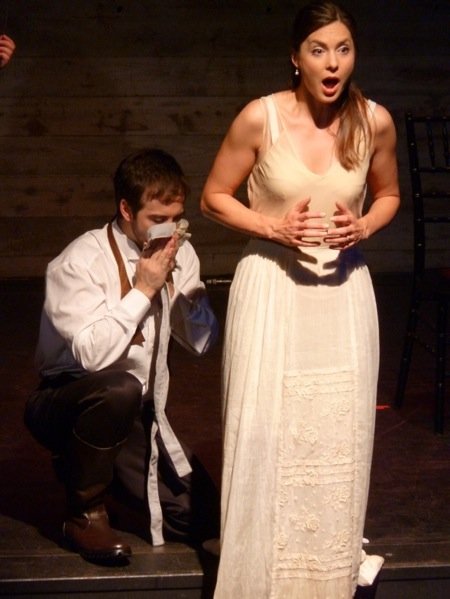Why is music compelling?
These past few weeks, I’ve been taking a break from professional performances and have indulged in practicing just for the love of it. Musicians don’t always have the luxury to work on pieces that aren’t about to be performed, since the life of a musician is just as busy as any other demanding profession. But once in a while, we get a respite and the opportunity to play. With sincere apologies to my neighbors, I have to admit that I’ve been enjoying practicing the stratospherically-high runs in the famous Queen of the Night aria (Der Holle Rache – you can find it here, starting 40 secs into the video) from Mozart’s The Magic Flute. Sometimes we just need to let it rip.
Baritone Ross Benoliel and soprano Indre Viskontas performing Daniel Felsenfeld’s chamber opera The Bloody Chamber.
When I do get the opportunity to just sing for fun, I get to experience all the emotions that I’m hoping to elicit from the audience while singing. We don’t always get to feel what we want others to feel because the emotional reaction can throw our technique out of whack. But when I give myself the green light, sometimes the intense emotional experience can be overwhelming: giving me goosebumps and the sublime sensation of shivers.
Having that experience males me wonder why we get the ‘chills’ from specific musical passages. Jaak Panksepp, an Estonian-born (we’re practically neighbors! as my mother would say) neuroscientist in Washington state has studied and written about this phenomenon for decades, with an influential paper published in 1995 showing that, contrary to our intuition, we get the chills when we listen to ‘sad’ music, rather than music that makes us feel happy. A solo line, often in the soprano register (lucky for me), emerging from a denser musical texture most often caused his subjects to experience chills. He also found that women are more likely than men to get goosebumps when listening to music.
He has since gone on to suggest that the experience of chills evoked by music is related to the distress that we feel when we are separated from someone we love and that this response has perhaps evolved to encourage mothers to respond to their crying babies. It’s easy to imagine many of the most memorable musical passages as separation calls: Whitney Houston’s version of Dolly Parton’s I will always love you, the guitar solo in The Eagles’ Hotel California, the vocalise by Rachmaninoff, to name just a few. The solo instrument, on a simple melodic line, emerging from a thicket of other sounds.
In a recent study, Blood and Zatorre, neuroscientists at McGill University, used neuroimaging to explore the parts of the brain that are activated during the experience of the chills evoked by music (you can find a copy here). They report that the same brain regions involved in other pleasurable activities, such as eating or having sex, including regions like the orbitofrontal and ventromedial prefrontal cortex, the striatum and the midbrain, are also involved in this experience. But what’s most interesting to me about their studies is the fact that exactly which musical passage evokes the experience is very much tied to the individual: just because I like it, or find it moving, doesn’t mean that you will. Of course, that observation is self-evident to most of us, and the staggering diversity of music available to us demonstrates that musical taste is deeply personal. By the same token, I’ve watched mothers pick out their own baby’s cry from a cacophony of sounds with remarkable ease.
What this research suggests is that, contrary to Steven Pinker’s view that music is simply ‘auditory cheesecake’, there might be some evidence that our preference for certain musical passages gave some of our early ancestors an evolutionary advantage: if your child’s cry gives you the chills, then perhaps you are more likely to respond and ensure that he lives another day.

